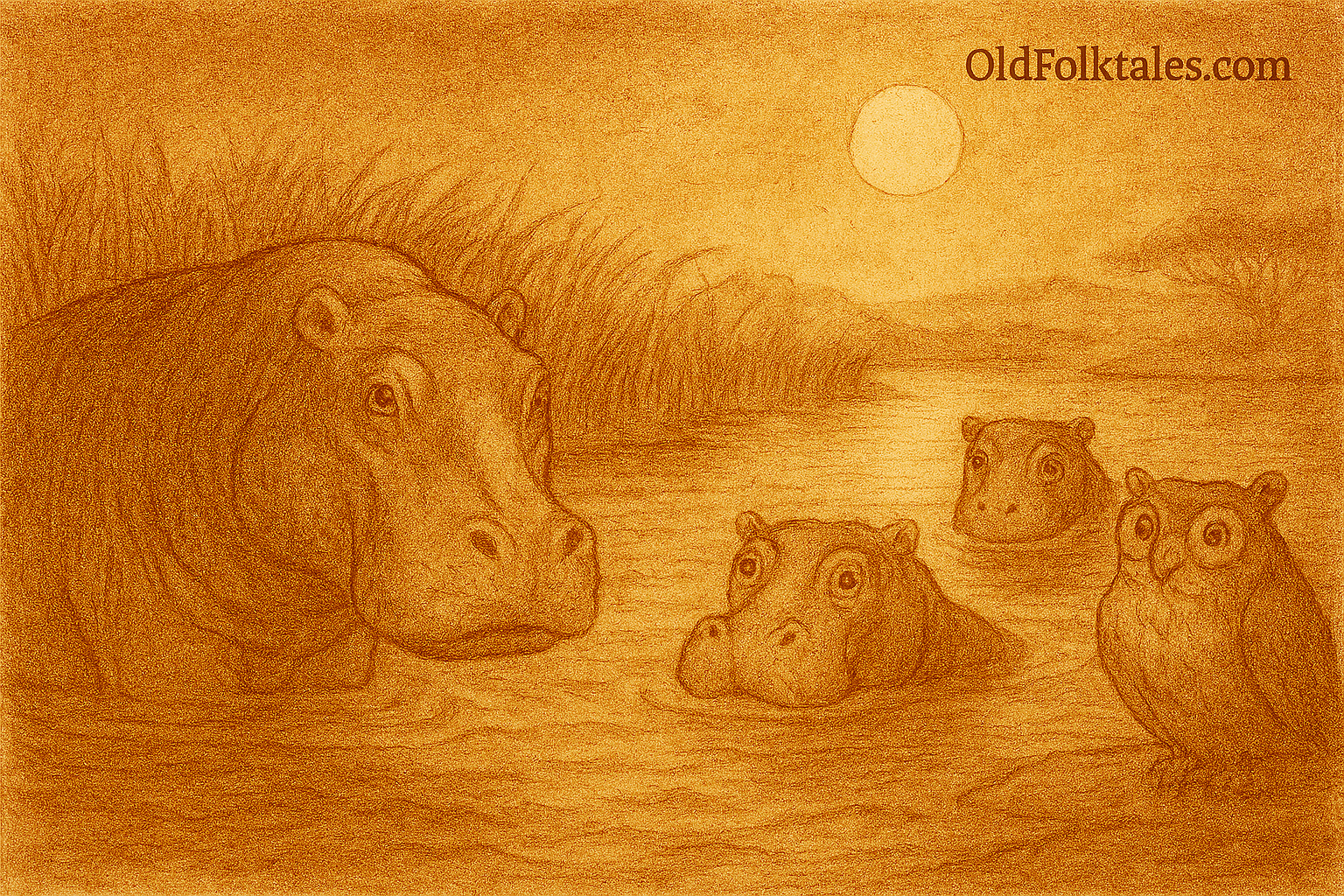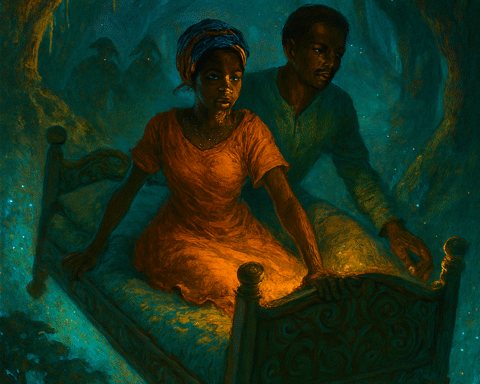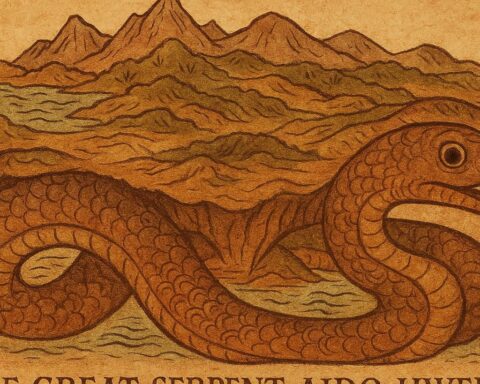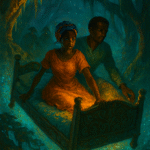Long before electric lights illuminated the banks of the mighty Niger River, when wooden trade boats groaned under the weight of precious millet and shimmering gold dust, the people of Mopti spoke in hushed whispers of mystical voices that drifted across the water in the depths of night. They told of three enormous hippos that emerged from the river’s darkest depths whenever the full moon climbed high above the water’s edge, their massive hides gleaming like polished bronze beneath the ethereal lunar glow.
These were no ordinary river beasts. When the moon reached its peak and cast silver pathways across the rippling water, the hippos would rise from their watery sanctuary, speaking in ancient cadences that echoed with the wisdom of forgotten ancestors. Their deep, resonant voices offered cryptic riddles and earnest warnings to those brave enough to listen but only to souls with humble hearts and open minds willing to receive their ancient counsel.
Fishermen who lingered at the water’s edge during these magical encounters would suddenly pause in their work, nets forgotten in their weathered hands, as they listened with reverent awe to the hippos’ rumbling tones. The great creatures spoke of hidden currents that could swallow unwary boats, of swelling floods that threatened entire villages, and of the river’s deepest mysteries that had been guarded for countless generations. In every syllable of their otherworldly speech, listeners could sense the profound wisdom of ancestors and the living spirit of the land itself.
Also read: The Warrior Princess of Mali
Over many centuries, village elders carefully preserved and passed down these moonlit encounters from one generation to the next. Young listeners would sit wide-eyed around flickering hearth fires, drinking in tales of riddles that tested courage and wit, of dire warnings that saved entire fishing communities from disaster, and of precious lessons about respecting nature’s ancient rhythms and honoring the delicate balance between humanity and the natural world.
Under the Moon’s Whisper
The first time the fishermen heard the hippos speak with human voices, they had ventured dangerously close to the deep channel where the current ran swift and treacherous, their nets trailing behind them and lanterns bobbing like fireflies in the darkness. The moon hung just past its silvery crest, and a thin, mysterious mist had settled over the river’s surface like a gossamer veil. Without any warning, a deep, thunderous rumble rose from the depths below.
At first, the startled fishermen thought they were hearing distant thunder, but when they looked up, the star-studded sky remained perfectly calm and clear. Suddenly, a massive silhouette breached the water’s surface, its luminous eyes glowing with an otherworldly light that seemed to pierce straight through to their very souls. Then came the voice steady, patient, and deeply resonant speaking in Malinké, a language far older and more ancient than any dialect the men had learned from their fathers and grandfathers.
The great hippo offered them a riddle that would test their wisdom and wit: “I flow without wind, I change without touch; I vanish but return what am I?” The fishermen trembled at the thought of speaking back to a creature so vast and powerful, but one particularly brave soul among them whispered his answer into the night air: “The moon’s own reflection dancing on restless water.” The hippo’s deep, baritone chuckle rolled across the moonlit channel like distant ceremonial drums, acknowledging the correctness of his response.
Every night thereafter, a small group of the most courageous fishermen gathered in secret along the riverbank, their hearts pounding with anticipation and reverence as the mystical hippos emerged from their watery realm. The magnificent creatures would share tales of shifting currents that could trap the unwary, of fishing nets that would become hopelessly entangled, and of hidden shoals that could dash boats to splinters. Each cryptic riddle carried within it a vital lesson: respect the river’s ancient rhythm and honor its power, or risk having your canoe capsized by forces beyond mortal understanding.
Each prophetic warning proved to save precious lives and protect the livelihoods of entire families, gradually forging an unbreakable spiritual bond between the human community and these divine river guardians that grew deeper and more profound with every passing moon. As word of these miraculous encounters spread throughout the village, the fishermen learned to listen for even the subtlest cues the distinctive sound of the hippos’ breath disturbing the water’s surface, the specific patterns of their deep grunts and calls, and the measured cadence of their mystical questions.
Riddles in the Reeds
The hippos’ second great counsel came during the season when the tall reeds stood dense and proud along the riverbank, their feathery tops brushing against the sides of passing boats with soft, sibilant whispers that seemed to carry secrets on the evening breeze. Seven brave fishermen paddled their wooden canoes through the curtain-like stalks toward a full moon that hovered in the darkening sky like an ancient omen of things to come.
A profound silence fell over the water as they rounded a familiar bend in the river, and three magnificent shapes glimmered mysteriously at the water’s edge, their eyes reflecting the moonlight like precious gems. The largest hippo, clearly the leader of the trio, spoke first in a voice like low thunder that seemed to vibrate through the very bones of the awestruck listeners.
“What builds bridges unseen between hearts,” the creature intoned solemnly, “yet crumbles to dust if stretched too thin?” The hippo’s eyes glowed like hidden coals as it fixed its penetrating gaze upon the small group of mortals.
The fishermen glanced nervously at each other, their minds racing to solve this profound riddle. Among them was Mariama, the only woman brave enough to join their moonlit vigil, who paused thoughtfully to recall her wise mother’s oft-repeated words about how families were built upon foundations of trust, but that same trust could falter and break under too much strain.
“A promise,” she answered softly, her voice barely carrying across the still water.
In that sacred moment, the river itself seemed to still in acknowledgment of her wisdom and truth. The great hippos emitted a deep, approving rumble that resonated across the water, and they began to speak of promises that had been broken in ages past stories of merchants who had failed to return borrowed canoes as pledged, and of chieftains who had betrayed trusted allies for personal gain.
“Betray trust,” the hippos warned with voices heavy with ancient sorrow, “and the very waters themselves will carry the shame of your broken word far beyond these familiar banks, spreading like ripples that can never be called back.”
Echoes of the Deep
The final gathering of the talking hippos occurred during the joyous harvest festival, when ceremonial drums echoed powerfully across the vast plains and the entire world seemed to smell of fresh millet and fragrant woodsmoke from countless cooking fires. The fishermen, village elders, and women of the community assembled together on makeshift platforms constructed beneath the spreading branches of ancient baobab trees, carrying flickering torches that danced and wavered in the gathering dusk.
At the familiar river’s edge, the three majestic hippos emerged one final time, each announcing the presence of the others with low, mournful calls that rolled through the valley like a funeral dirge. Their luminous eyes burned like glowing embers as they fixed the assembled villagers with a gaze heavy with the weight of impending farewell.
“We have faithfully guided you through raging floods, devastating famines, and heartbreaking betrayals,” the lead hippo intoned with infinite sadness. “Tonight, we offer you one final riddle to carry in your hearts: What binds hearts together across generations, spans the gulf between past and future, yet you cannot hold it in your mortal hands?”
Confused murmurs rippled through the gathered crowd like wind through grain. Children looked up questioningly at their mothers’ worried faces, while village elders frowned deeply in contemplation. At last, a young girl named Awa stepped forward from the crowd and whispered with innocent wisdom, “A story.”
The great hippo’s massive, horn-crowned head dipped in solemn approval of her answer. “Indeed, child. A story is a living thread that connects the past to the future, weaving together the experiences of all who came before with all who are yet to come. Cherish these tales, guard them as you would your most precious treasures, and pass them forward to your children’s children, so that wisdom may never die.”
As the first hints of dawn began to lighten the eastern horizon, the magnificent hippos slowly faded back into the dark waters that had been their eternal home, leaving behind only a mystical presence that lingered in the air like the faint perfume of night-blooming flowers. The people remained standing in reverent awe, feeling an intimate spiritual bond with these creatures they had once viewed merely as formidable river wildlife.
In the years that followed, the Legend of the Talking Hippos of Mopti transcended its humble origins along the Niger River. The tale inspired wandering songwriters and traveling poets, and drew young explorers who drifted downstream in slender canoes, hoping to catch a glimpse of the mythical guardians. With each new retelling around distant campfires, fresh verses were woven into the ancient narrative, and new lessons were drawn from the hippos’ timeless wisdom that seemed to speak to the universal human experience.
The Moral Lesson
This timeless folktale teaches us that true wisdom often comes from unexpected sources, and that we must remain humble and open-hearted to receive guidance from the natural world around us. The talking hippos represent the voice of ancestral wisdom and environmental consciousness, reminding us that our relationship with nature should be one of respect, reciprocity, and careful listening rather than domination and exploitation.
Knowledge Check
Q1: Who were the main characters in the Talking Hippos of Mopti folktale? A: The main characters included three wise talking hippos who served as river guardians, brave fishermen who listened to their counsel, Mariama (a woman who correctly answered a riddle about promises), young Salif (who ignored warnings and nearly drowned), and Awa (a girl who identified “story” as the final riddle’s answer).
Q2: What cultural significance do the talking hippos represent in Mali folklore? A: In this West African folktale, the talking hippos represent ancestral wisdom, environmental guardians, and spiritual bridges between the human world and the natural realm. They embody the traditional African concept of animals as wise counselors who help maintain harmony between communities and their environment.
Q3: What types of riddles and warnings did the hippos share with the villagers? A: The hippos shared riddles about natural phenomena (moon’s reflection on water, promises, rain), practical warnings about river dangers (hidden sandbars, whirlpools, crocodiles), and prophecies about floods and droughts that helped the village prepare for environmental challenges.
Q4: How did the villagers of Mopti respond to the hippos’ guidance? A: The villagers showed deep respect by marking dangerous areas with floating gourds, rationing fish during predicted scarcity, reinforcing granaries before floods, offering kola nuts and millet as tribute, and carefully recording the hippos’ words on palm leaves and wooden paddles for future generations.
Q5: What does the Niger River setting symbolize in this Mali folktale? A: The Niger River symbolizes the source of life, wisdom, and spiritual connection in Mali culture. It represents the flowing nature of knowledge between generations and serves as a sacred boundary between the physical and spiritual worlds where ancient wisdom can be accessed.
Q6: What lesson about storytelling traditions does the final riddle convey? A: The final riddle about stories teaches that oral traditions are the “living threads” that connect past to future generations, emphasizing the crucial importance of preserving and passing down cultural wisdom, values, and ancestral knowledge through narrative storytelling.
Source: Traditional folktale from Mopti region, Mali, West Africa






